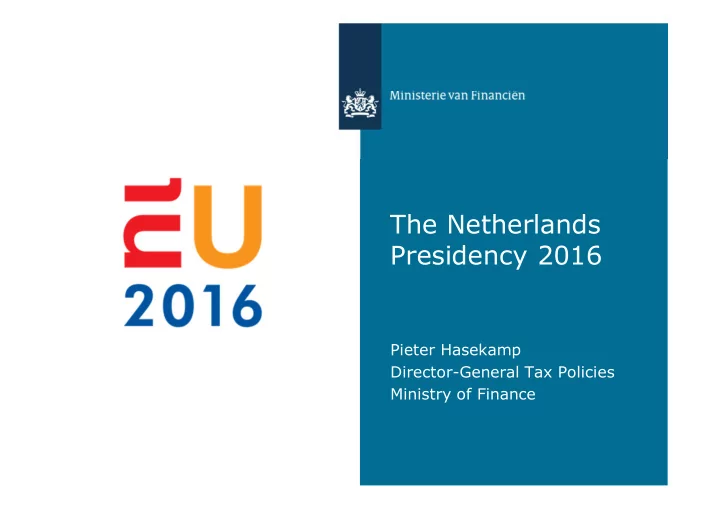

The Netherlands Presidency 2016 Pieter Hasekamp Director-General Tax Policies Ministry of Finance
Agenda • Presidency EU Council • The Dutch approach • Tax matters to be discussed • Conclusions
Presidency EU Council
Overview EU institutions NL (1st half Juncker Schulz 2016) EU EU Council European Commission Ecofin Council Parliament • Right of • Discusses • Codecision initiative legislation • No codecision (legislator) EU Commission in tax matters • Guardian • Agreement • TAXE EU law after vote Committee 4 Presidency EU Council
Presidency role Chair Council of Ministers Agenda Compromise proposal Limited influence No right of initiative European Council ( European Summit ) Rule of unanimity 5 Presidency EU Council
The Dutch approach
The Dutch approach Sober Facilitating the process Neutral approach (“honest broker”) Pragmatic Good logistics and early sending of Room Docs 7 The Dutch approach
Tax matters
Direct taxation Anti-Tax Avoidance Directive (ATAD) 28 January 2016: publication by EU Commission Minimum harmonisation: MS can be stricter Several anti-abuse measures: Limitation of interest deduction Approach hybrid mismatches General Anti-Abuse Rule Switch-over rule, CFC rule Exit taxation Goal : partial agreement or policy debate 9 Tax matters
Direct taxation Interest & Royalties Directive Minimum effective taxation Divided opinions: Protection withholding tax versus Sovereignty on tax rate (no harmonisation) Goal : political agreement or orientation debate Link with action towards low taxed jurisdictions 10 Tax matters
Direct taxation Country by country reporting Implementation OECD CbCR Same rules for all EU countries Automatic exchange through existing network Goal : agreement Public CbCR: March 2016, Impact assessment Commission for CbCR (all companies) 11 Tax matters
Direct taxation EU and OECD: same, but different Interest & Royalties Directive Minimum effective taxation relation with nexus approach Anti-Tax Avoidance Directive: Both OECD and EU: Limitation of interest deduction, CFC rules, hybrids EU only: switch-over, exit taxation, GAAR Goal : coherent EU approach against tax abuse 12 Tax matters
Direct taxation Soft law Strategy with regard to third countries (Black listing) Recommendation on the implementation BEPS output on treaty abuse and permanent establishments Reform of the Code of Conduct group Mandate Governance Ongoing work of the Code Group: Patent boxes Hybrid mismatches Assessment of potential harmful regimes 13 Tax matters
Indirect taxes VAT Fraud High priority, 150 billion euros a year EU wide Reverse Charge mechanism will be discussed March VAT Action Plan: will discuss various anti- fraud measures April Informal Ecofin Council: VAT Fraud June Ecofin Council: Dutch Presidency will strive for Council conclusions on the way forward (both short-term and long-term measures) 14 Tax matters
Indirect taxes VAT rates Several discussions on the structure of VAT rates in the EU are pending: minimum rate; limited list of reduced rates; VAT in the digital economy. March VAT Action Plan: Commission will discuss several solutions on the structure of VAT rates. June Ecofin Council: Dutch Presidency will strive for Council Conclusions on the way forward. 15 Tax matters
Indirect taxes Vouchers and VAT Commission Proposal on the VAT treatment of vouchers VAT treatment of all types of vouchers (such as prepaid phone cards, dinner vouchers, etc.). In particular, cross boarder situations are unclear After four years of negotiations, the Council Working Party is on a crossroad Dutch Presidency in the process of bilateral talks with some Member States on an effective way forward, with the ambition to get a political agreement 16 Tax matters
Overview important dates tax matters January: ATAD March: VAT Action Plan April: Informal Ecofin Council: VAT fraud June: Last Ecofin, possibly Council Conclusions on various Tax Files 17 Tax matters
Conclusions
Conclusions Ambitious Focus on implementing BEPS Action Plan Putting VAT Fraud back on the agenda 19 Conclusions
Recommend
More recommend